Memoir of John Shakespear Bartley, 1916-1919 - Part 3
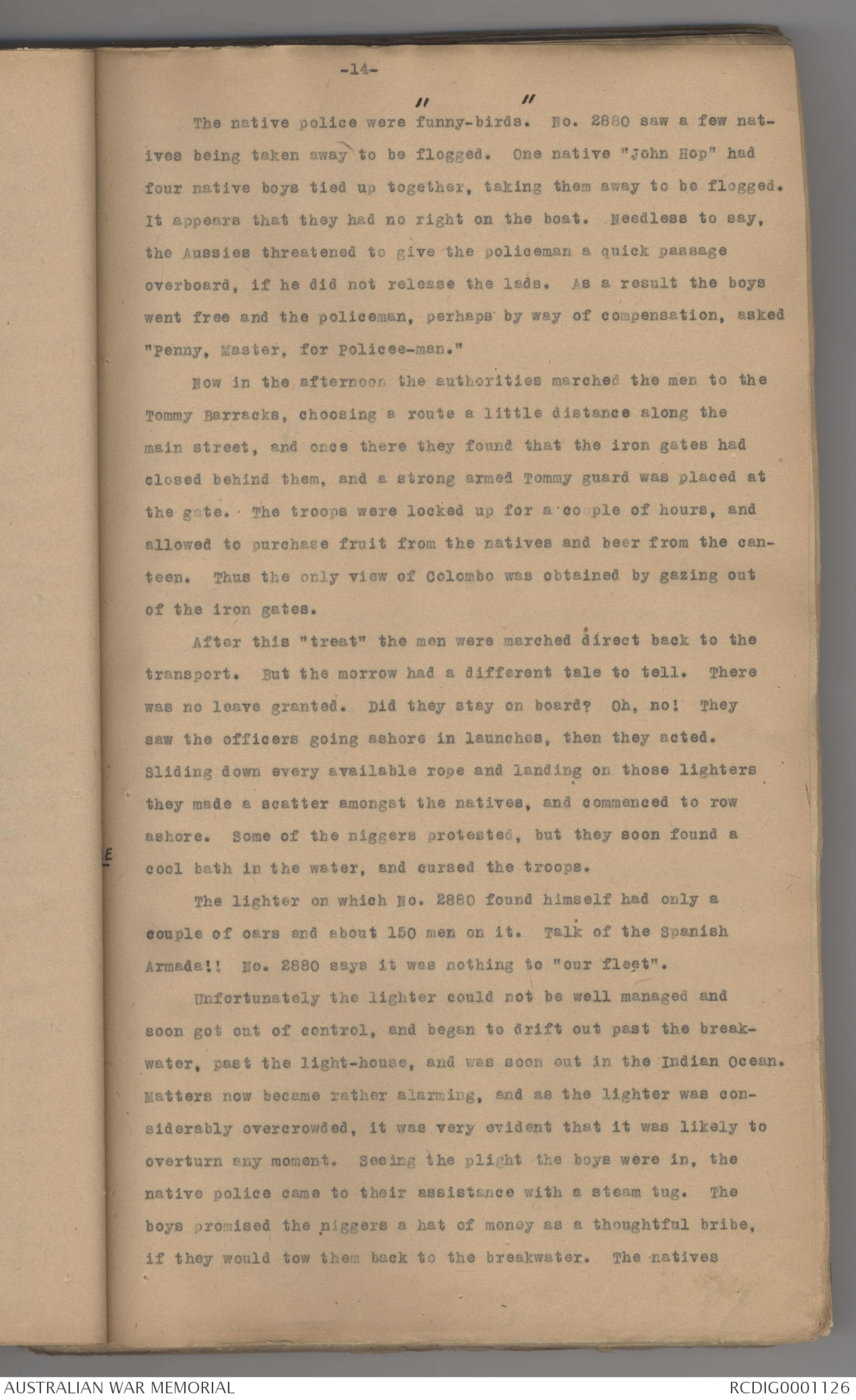
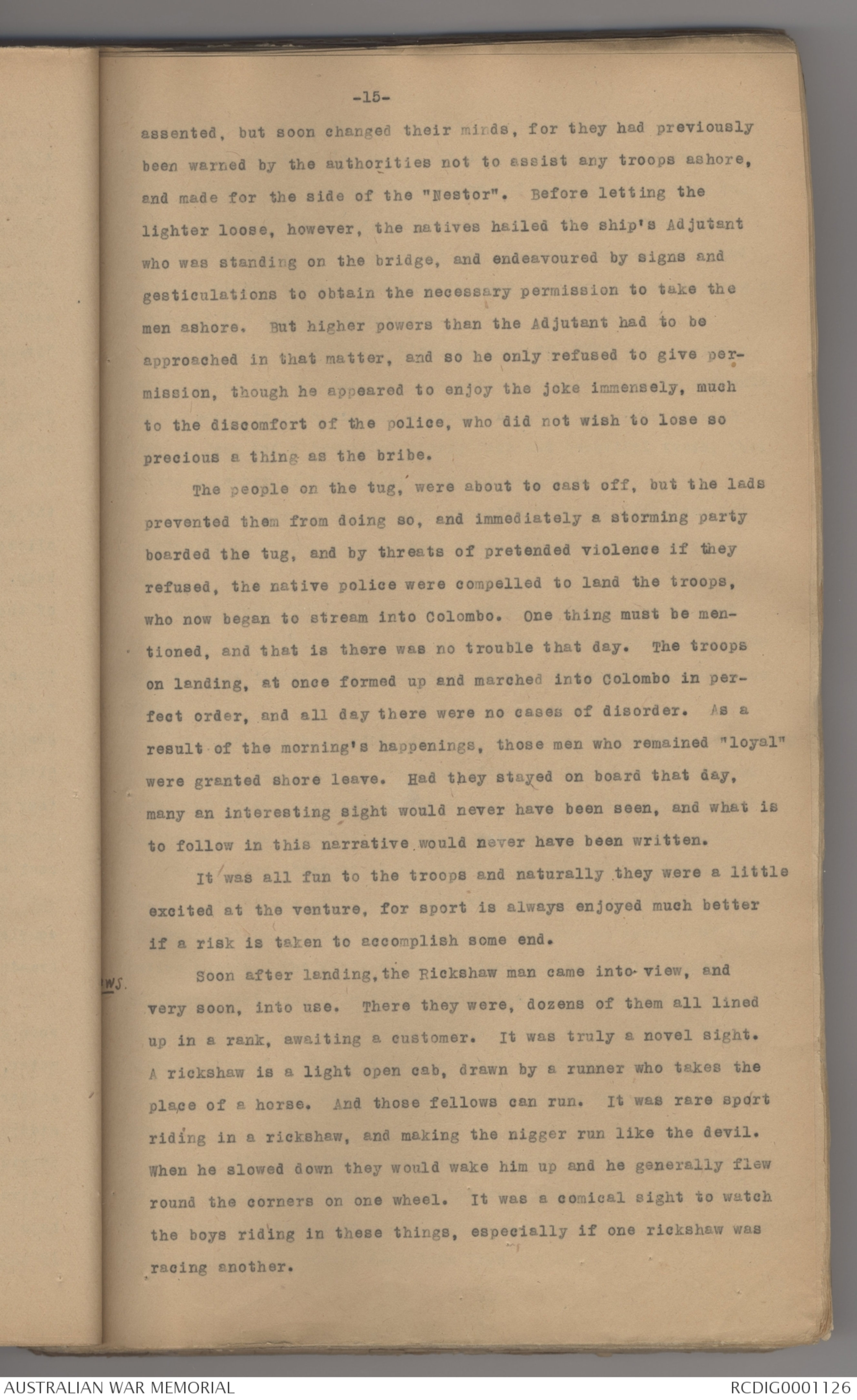
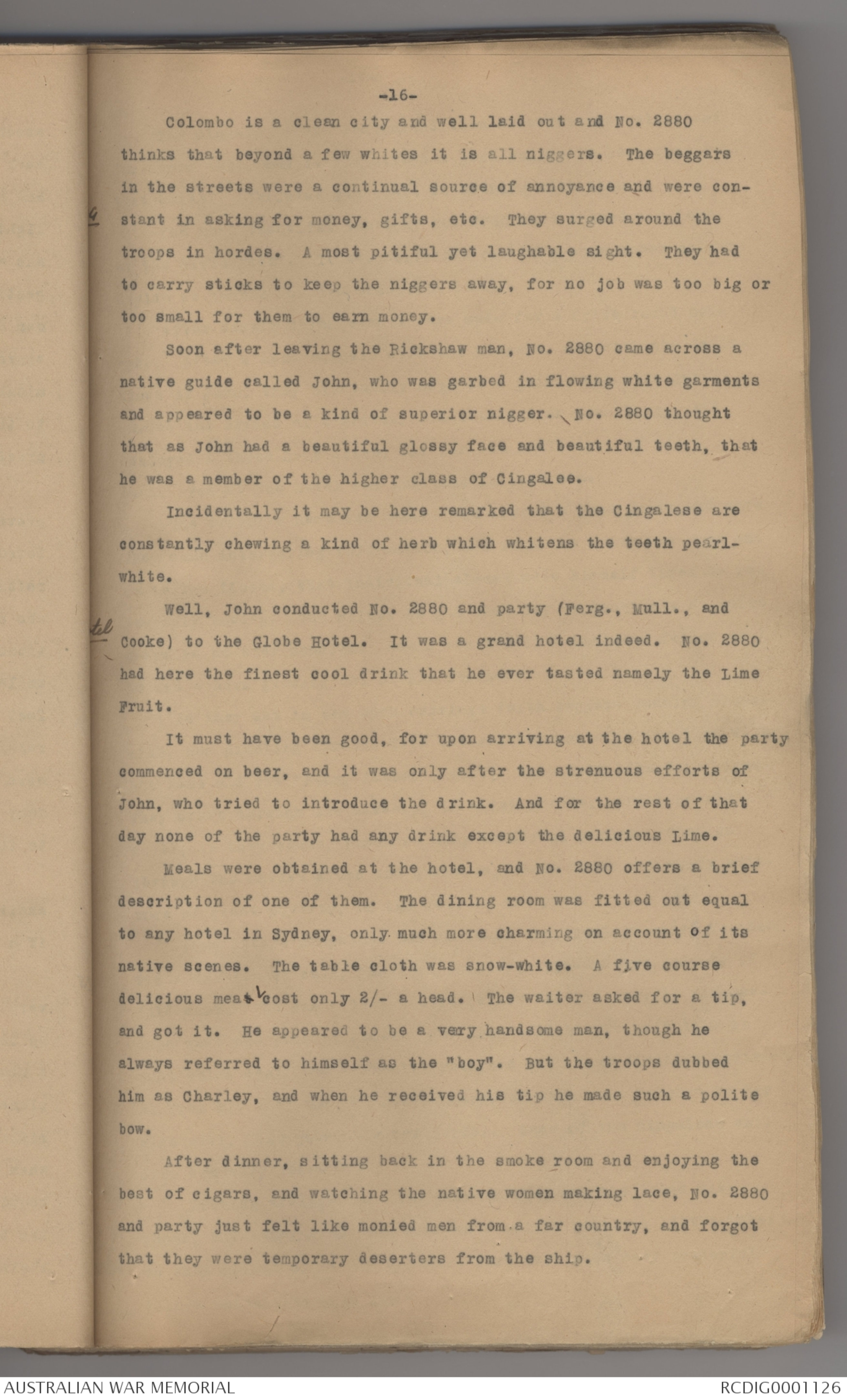
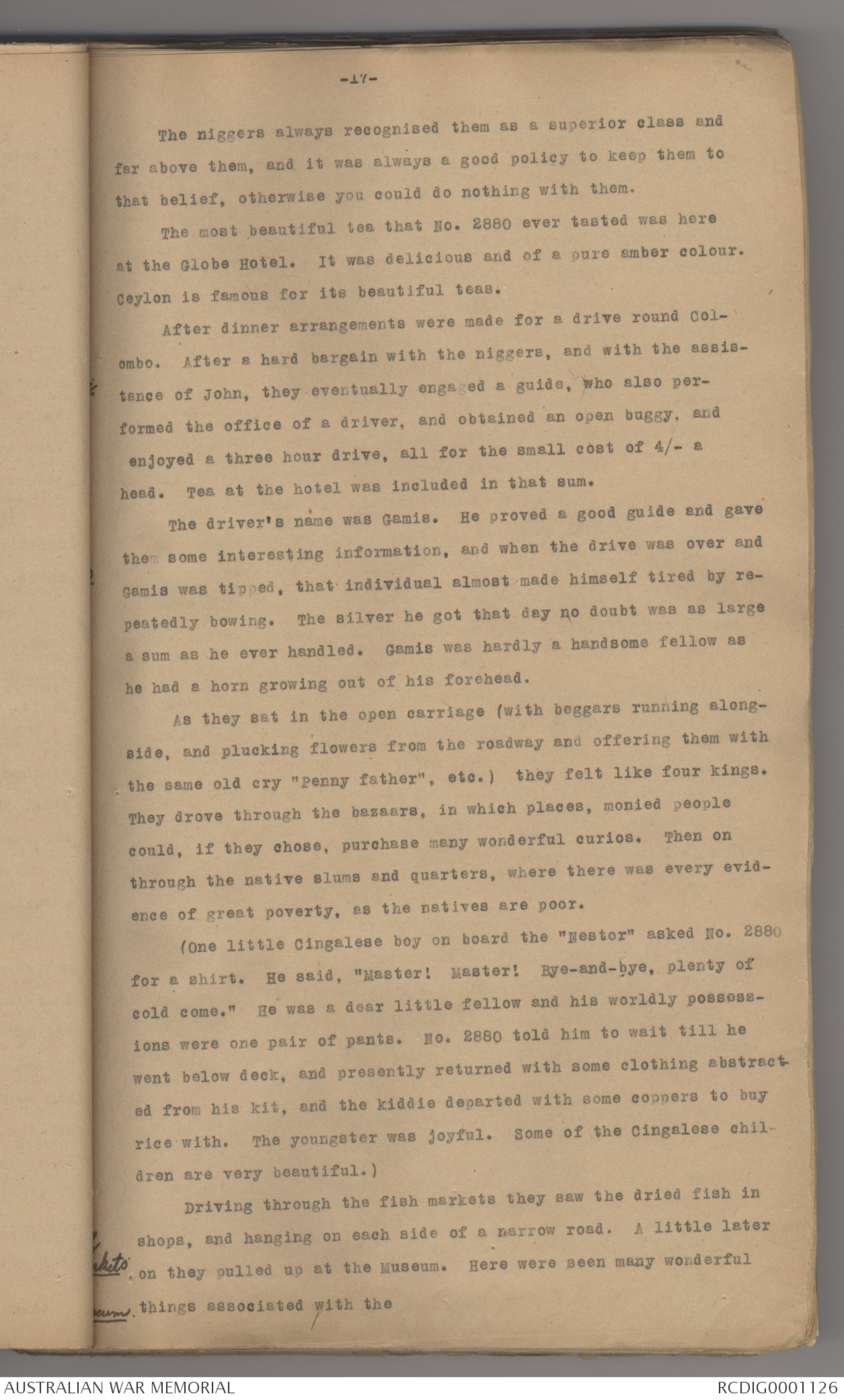
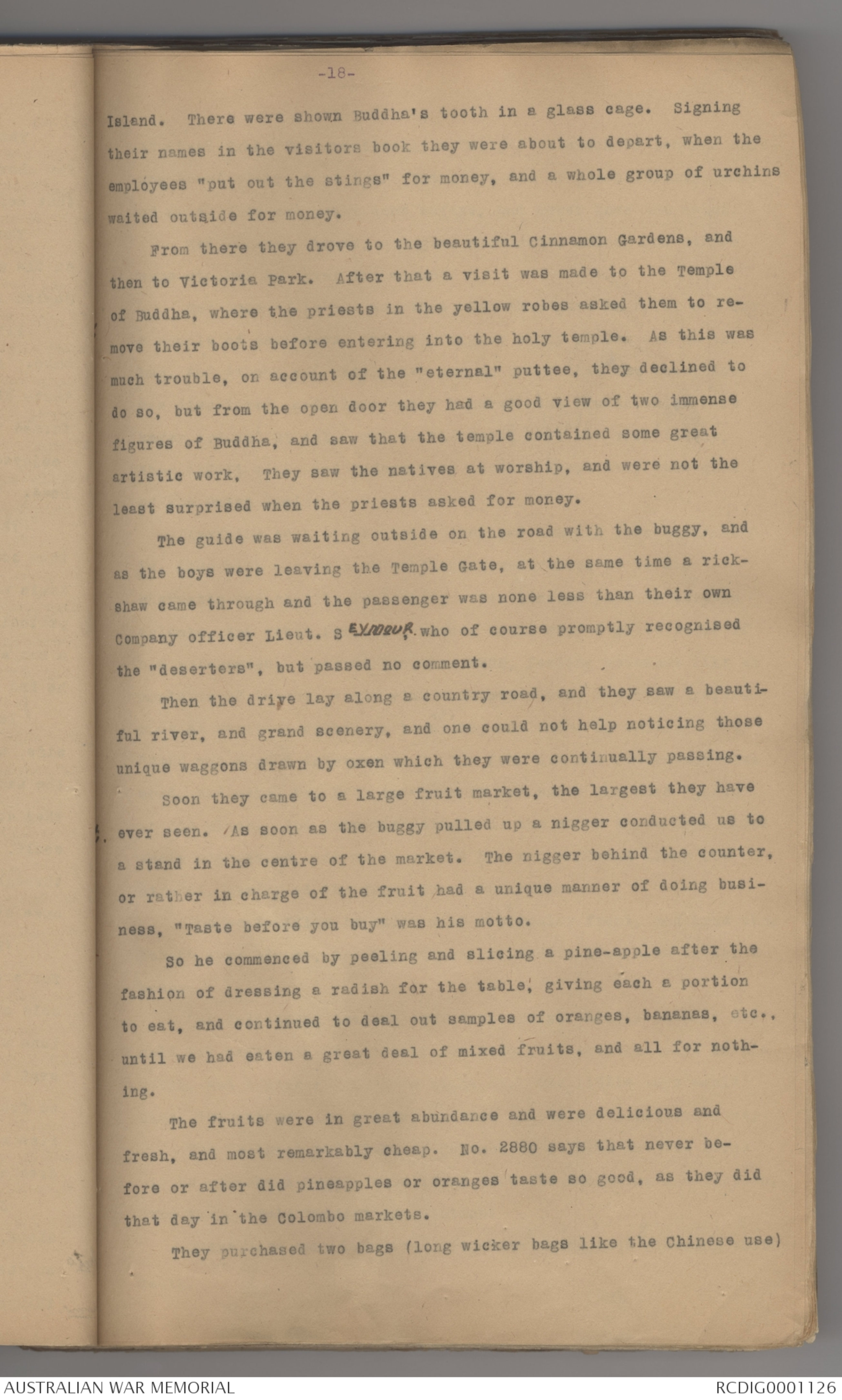
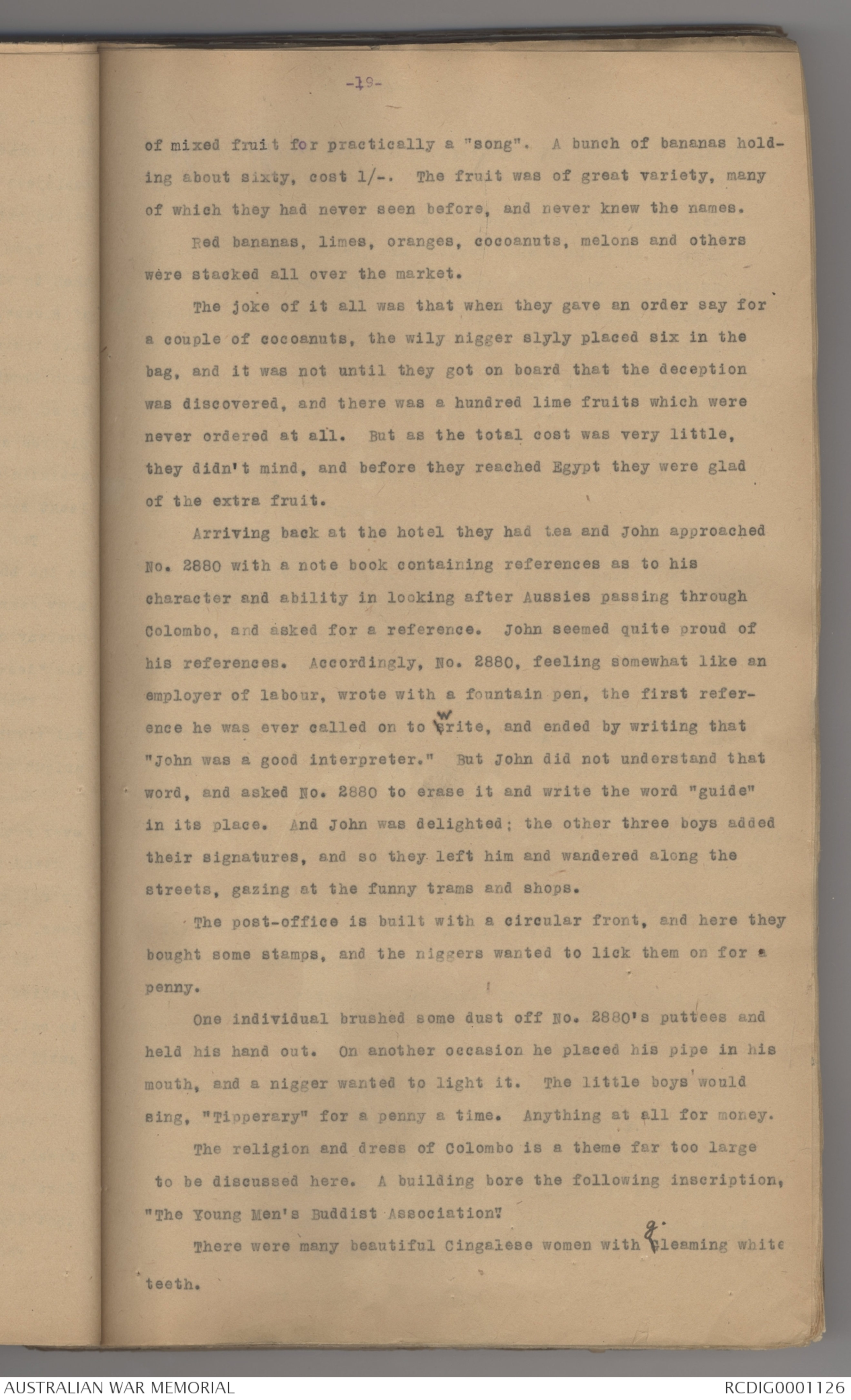
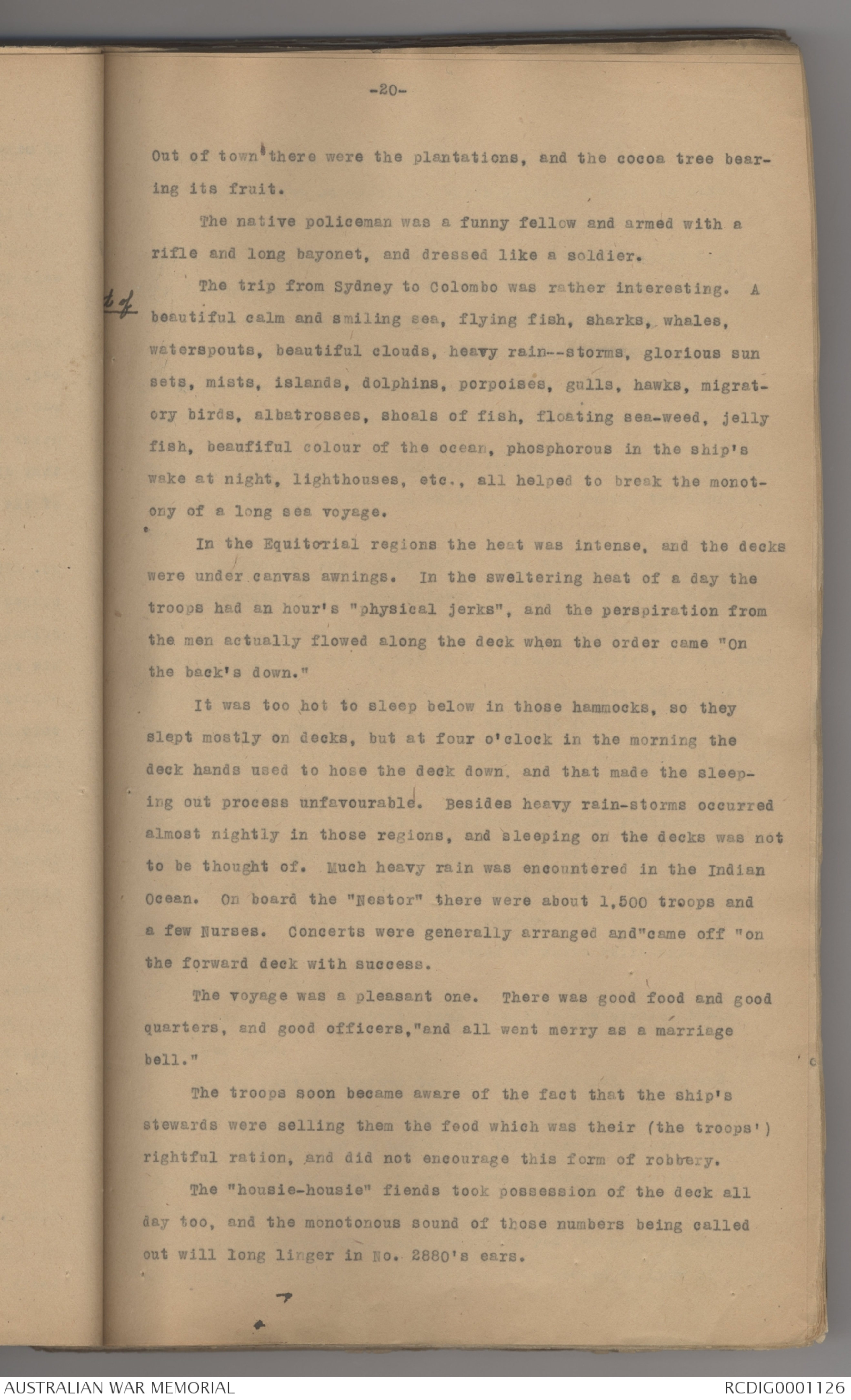
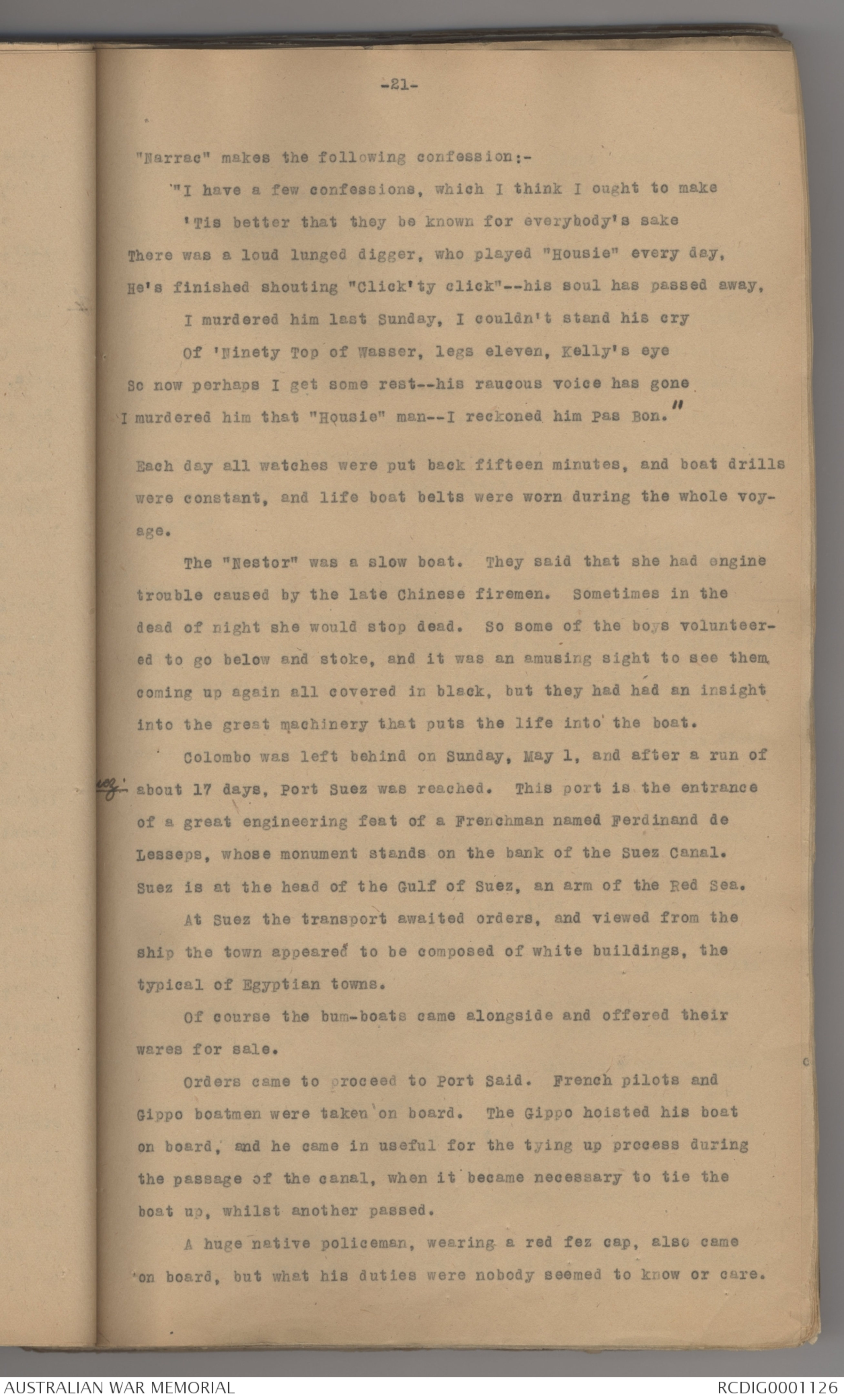
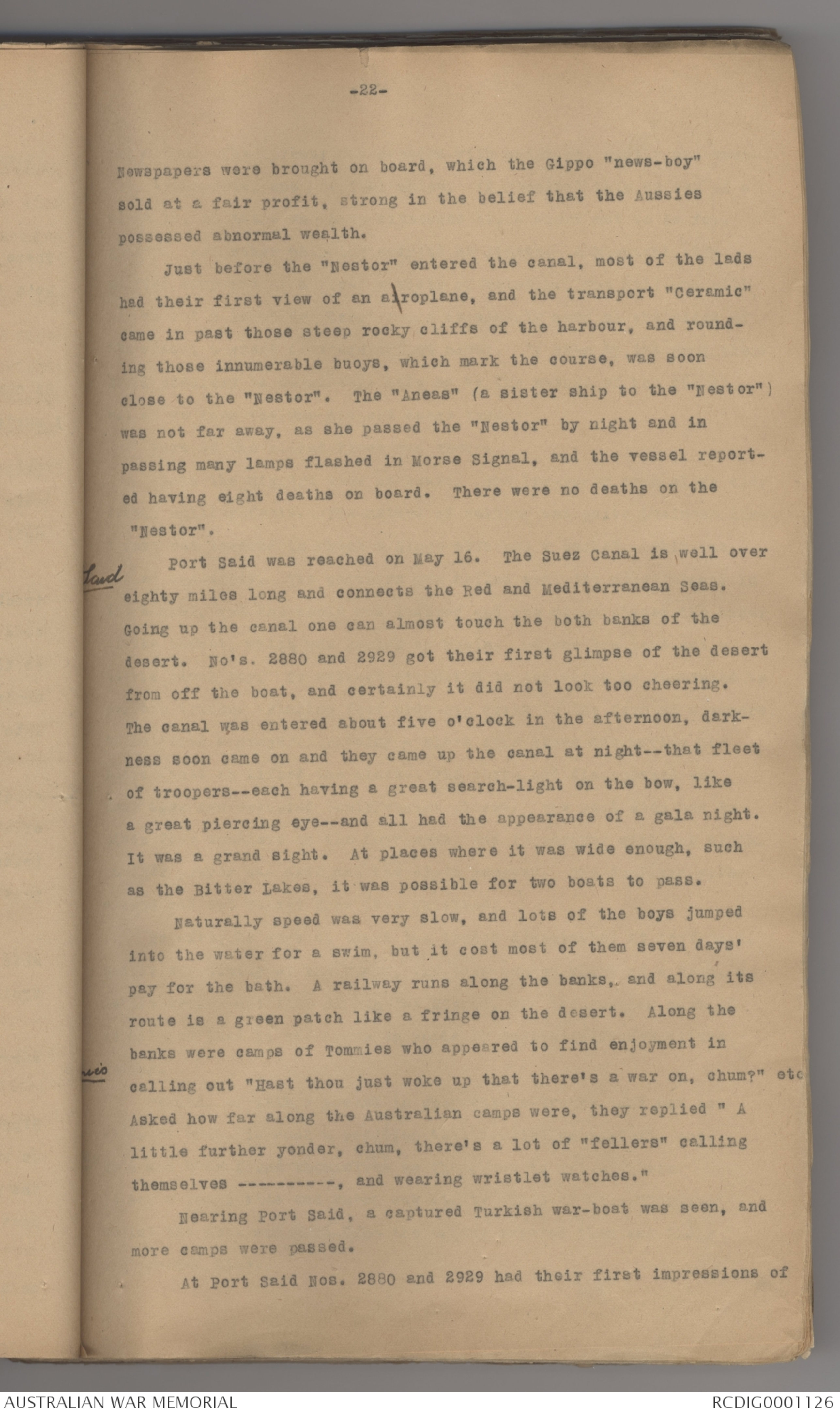
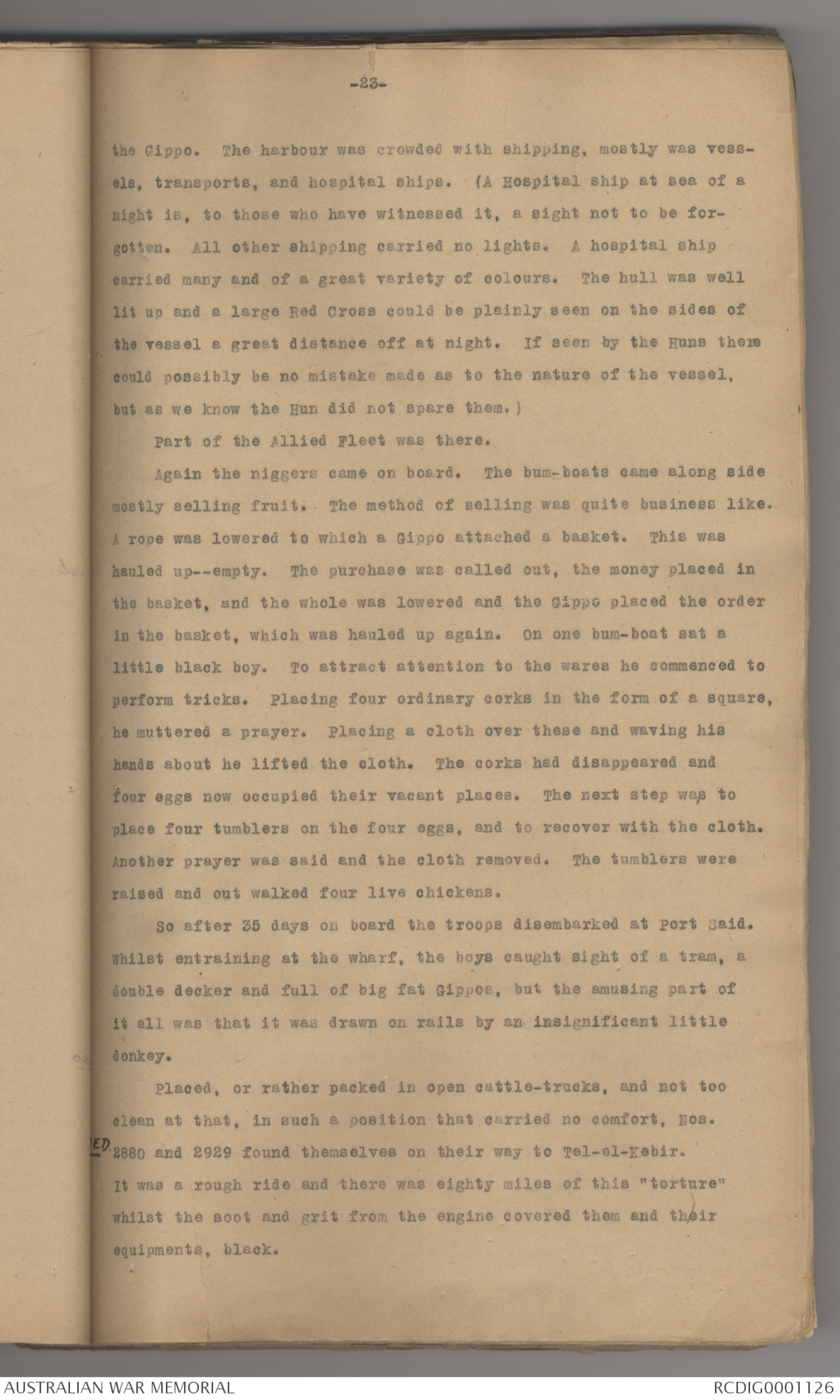
-14-
The native police were "funny-birds." No. 2880 saw a few natives
being taken away to be flogged. One native "John Hop" had
four native boys tied up together, taking them away to be flogged.
It appears that they had no right on the boat. Needless to say,
the Aussies threatened to give the policeman a quick passage
overboard, if he did not release the lads. As a result the boys
went free and the policeman, perhaps by way of compensation, asked
"Penny, Master, for Policee-man."
Now in the afternoon the authorities marched the men to the
Tommy Barracks, choosing a route a little distance along the
main street, and once there they found that the iron gates had
closed behind them, and a strong armed Tommy guard was placed at
the gate. The troops were locked up for a couple of hours, and
allowed to purchase fruit from the natives and beer from the canteen.
Thus the only view of Colombo was obtained by gazing out
of the iron gates.
After this "treat" the men were marched direct back to the
transport. But the morrow had a different tale to tell. There
was no leave granted. Did they stay on board? Oh, no! They
saw the officers going ashore in launches, then they acted.
Sliding down every available rope and landing on those lighters
they made a scatter amongst the natives, and commenced to row
ashore. Some of the niggers protested, but they soon found a
cool bath in the water, and cursed the troops.
The lighter on which No. 2880 found himself had only a
couple of oars and about 150 men on it. Talk of the Spanish
Armada!! No. 2880 says it was nothing to "our fleet".
Unfortunately the lighter could not be well managed and
soon got out of control, and began to drift out past the breakwater,
past the light-house, and was soon out in the Indian Ocean.
Matters now became rather alarming, and as the lighter was considerably overcrowded, it was very evident that it was likely to
overturn any moment. Seeing the plight the boys were in, the
native police came to their assistance with a steam tug. The
boys promised the niggers a hat of money as a thoughtful bribe,
if they would tow them back to the breakwater. The natives
-15-
assented, but soon changed their minds, for they had previously
been warned by the authorities not to assist any troops ashore,
and made for the side of the "Nestor". Before letting the
lighter loose, however, the natives hailed the ship's Adjutant
who was standing on the bridge, and endeavoured by signs and
gesticulations to obtain the necessary permission to take the
men ashore. But higher powers than the Adjutant had to be
approached in that matter, and so he only refused to give permission,
though he appeared to enjoy the joke immensely, much
to the discomfort of the police, who did not wish to lose so
precious a thing as the bribe.
The people on the tug, were about to cast off, but the lads
prevented them from doing so, and immediately a storming party
boarded the tug, and by threats of pretended violence if they
refused, the native police were compelled to land the troops,
who now began to stream into Colombo. One thing must be mentioned,
and that is there was no trouble that day. The troops
on landing, at once formed up and marched into Colombo in perfect
order, and all day there were no cases of disorder. As a
result of the morning's happenings, those men who remained "loyal"
were granted shore leave. Had they stayed on board that day,
many an interesting sight would never have been seen, and what is
to follow in this narrative would never have been written.
It was all fun to the troops and naturally they were a little
excited at the venture, for sport is always enjoyed much better
if a risk is taken to accomplish some end.
Soon after landing,the Rickshaw man came into view, and
very soon, into use. There they were, dozens of them all lined
up in a rank, awaiting a customer. It was truly a novel sight.
A rickshaw is a light open cab, drawn by a runner who takes the
place of a horse. And those fellows can run. It was rare sport
riding in a rickshaw, and making the nigger run like the devil.
When he slowed down they would wake him up and he generally flew
round the corners on one wheel. It was a comical sight to watch
the boys riding in these things, especially if one rickshaw was
racing another.
-16-
Colombo is a clean city and well laid out and No. 2880
thinks that beyond a few whites it is all niggers. The beggars
in the streets were a continual source of annoyance and were constant
in asking for money, gifts, etc. They surged around the
troops in hordes. A most pitiful yet laughable sight. They had
to carry sticks to keep the niggers away, for no job was too big or
too small for them to earn money.
Soon after leaving the Rickshaw man, No. 2880 came across a
native guide called John, who was garbed in flowing white garments
and appeared to be a kind of superior nigger. No. 2880 thought
that as John had a beautiful glossy face and beautiful teeth, that
he was a member of the higher class of Cingalee.
Incidentally it may be here remarked that the Cingalese are
constantly chewing a kind of herb which whitens the teeth pearl-
white.
Well, John conducted No. 2880 and party (Ferg., Mull., and
Cooke) to the Globe Hotel. It was a grand hotel indeed. No. 2880
had here the finest cool drink that he ever tasted namely the Lime
Fruit.
It must have been good, for upon arriving at the hotel the party
commenced on beer, and it was only after the strenuous efforts of
John, who tried to introduce the drink. And for the rest of that
day none of the party had any drink except the delicious Lime.
Meals were obtained at the hotel, and No. 2880 offers a brief
description of one of them. The dining room was fitted out equal
to any hotel in Sydney, only much more charming on account of its
native scenes. The table cloth was snow-white. A five course
delicious meal cost only 2/- a head. The waiter asked for a tip,
and got it. He appeared to be a very handsome man, though he
always referred to himself as the "boy". But the troops dubbed
him as Charley, and when he received his tip he made such a polite
bow.
After dinner, sitting back in the smoke room and enjoying the
best of cigars, and watching the native women making lace, No. 2880
and party just felt like monied men from a far country, and forgot
that they were temporary deserters from the ship.
-17-
The niggers always recognised them as a superior class and
far above them, and it was always a good policy to keep them to
that belief, otherwise you could do nothing with them.
The most beautiful tea that No. 2880 ever tasted was here
at the Globe Hotel. It was delicious and of a pure amber colour.
Ceylon is famous for its beautiful teas.
After dinner arrangements were made for a drive round Colombo.
After a hard bargain with the niggers, and with the assistance
of John, they eventually engaged a guide, who also performed
the office of a driver, and obtained an open buggy, and
enjoyed a three hour drive, all for the small cost of 4/- a
head. Tea at the hotel was included in that sum.
The driver's name was Gamis. He proved a good guide and gave
them some interesting information, and when the drive was over and
Gamis was tipped, that individual almost made himself tired by repeatedly bowing. The silver he got that day no doubt was as large
a sum as he ever handled. Gamis was hardly a handsome fellow as
he had a horn growing out of his forehead.
As they sat in the open carriage (with beggars running alongside,
and plucking flowers from the roadway and offering them with
the same old cry "Penny father", etc.) they felt like four kings.
They drove through the bazaars, in which places, monied people
could, if they chose, purchase many wonderful curios. Then on
through the native slums and quarters, where there was every evidence
of great poverty, as the natives are poor.
(One little Cingalese boy on board the "Nestor" asked No. 2880
for a shirt. He said, "Master! Master! Bye-and-bye, plenty of
cold come." He was a dear little fellow and his worldly possessions
were one pair of pants. No. 2880 told him to wait till he
went below deck, and presently returned with some clothing abstracted
from his kit, and the kiddie departed with some coppers to buy
rice with. The youngster was joyful. Some of the Cingalese children
are very beautiful.)
Driving through the fish markets they saw the dried fish in
shops, and hanging on each side of a narrow road. A little later
on they pulled up at the Museum. Here were seen many wonderful
things associated with the
-18-
Island. There were shown Buddha's tooth in a glass cage. Signing
their names in the visitors book they were about to depart, when the
employees "put out the stings" for money, and a whole group of urchins
waited outside for money.
From there they drove to the beautiful Cinnamon Gardens, and
then to Victoria Park. After that a visit was made to the Temple
of Buddha, where the priests in the yellow robes asked them to remove
their boots before entering into the holy temple. As this was
much trouble, on account of the "eternal" puttee, they declined to
do so, but from the open door they had a good view of two immense
figures of Buddha, and saw that the temple contained some great
artistic work. They saw the natives at worship, and were not the
least surprised when the priests asked for money.
The guide was waiting outside on the road with the buggy, and
as the boys were leaving the Temple Gate, at the same time a rickshaw
came through and the passenger was none less than their own
Company officer Lieut. SEYMOUR who of course promptly recognised
the "deserters", but passed no comment.
Then the drive lay along a country road, and they saw a beautiful
river, and grand scenery, and one could not help noticing those
unique waggons drawn by oxen which they were continually passing.
Soon they came to a large fruit market, the largest they have
ever seen. As soon as the buggy pulled up a nigger conducted us to
a stand in the centre of the market. The nigger behind the counter,
or rather in charge of the fruit had a unique manner of doing business,
"Taste before you buy" was his motto.
So he commenced by peeling and slicing a pine-apple after the
fashion of dressing a radish for the table, giving each a portion
to eat, and continued to deal out samples of oranges, bananas, etc..
until we had eaten a great deal of mixed fruits, and all for nothing.
The fruits were in great abundance and were delicious and
fresh, and most remarkably cheap. No. 2880 says that never before
or after did pineapples or oranges taste so good, as they did
that day in the Colombo markets.
They purchased two bags (long wicker bags like the Chinese use)
-19-
of mixed fruit for practically a "song". A bunch of bananas holding
about sixty, cost 1/-. The fruit was of great variety, many
of which they had never seen before, and never knew the names.
Red bananas, limes, oranges, cocoanuts, melons and others
were stacked all over the market.
The joke of it all was that when they gave an order say for
a couple of cocoanuts, the wily nigger slyly placed six in the
bag, and it was not until they got on board that the deception
was discovered, and there was a hundred lime fruits which were
never ordered at all. But as the total cost was very little,
they didn't mind, and before they reached Egypt they were glad
of the extra fruit.
Arriving back at the hotel they had tea and John approached
No. 2880 with a note book containing references as to his
character and ability in looking after Aussies passing through
Colombo, and asked for a reference. John seemed quite proud of
his references. Accordingly, No. 2880, feeling somewhat like an
employer of labour, wrote with a fountain pen, the first reference
he was ever called on to wbrite, and ended by writing that
"John was a good interpreter." But John did not understand that
word, and asked No. 2880 to erase it and write the word "guide"
in its place. And John was delighted; the other three boys added
their signatures, and so they left him and wandered along the
streets, gazing at the funny trams and shops.
The post-office is built with a circular front, and here they
bought some stamps, and the niggers wanted to lick them on for a
penny.
One individual brushed some dust off No. 2880's puttees and
held his hand out. On another occasion he placed his pipe in his
mouth, and a nigger wanted to light it. The little boys would
sing, "Tipperary" for a penny a time. Anything at all for money.
The religion and dress of Colombo is a theme far too large
to be discussed here. A building bore the following inscription,
"The Young Men's Buddist Association".
There were many beautiful Cingalese women with gGleaming white
teeth.
-20-
Out of town there were the plantations, and the cocoa tree bearing
its fruit.
The native policeman was a funny fellow and armed with a
rifle and long bayonet, and dressed like a soldier.
The trip from Sydney to Colombo was rather interesting. A
beautiful calm and smiling sea, flying fish, sharks, whales,
waterspouts, beautiful clouds, heavy rain--storms, glorious sun
sets, mists, islands, dolphins, porpoises, gulls, hawks, migratory
birds, albatrosses, shoals of fish, floating sea-weed, jelly
fish, beaufiful colour of the ocean, phosphorous in the ship's
wake at night, lighthouses, etc., all helped to break the monotony
of a long sea voyage.
In the Equitorial regions the heat was intense, and the decks
were under canvas awnings. In the sweltering heat of a day the
troops had an hour's "physical jerks", and the perspiration from
the men actually flowed along the deck when the order came "On
the back's down."
It was too hot to sleep below in those hammocks, so they
slept mostly on decks, but at four o'clock in the morning the
deck hands used to hose the deck down, and that made the sleeping
out process unfavourable. Besides heavy rain-storms occurred
almost nightly in those regions, and sleeping on the decks was not
to be thought of. Much heavy rain was encountered in the Indian
Ocean. On board the "Nestor" there were about 1,500 troops and
a few Nurses. Concerts were generally arranged and"came off "on
the forward deck with success.
The voyage was a pleasant one. There was good food and good
quarters, and good officers, "and all went merry as a marriage
bell."
The troops soon became aware of the fact that the ship's
stewards were selling them the food which was their (the troops')
rightful ration, and did not encourage this form of robbery.
The "housie-housie" fiends took possession of the deck all
day too, and the monotonous sound of those numbers being called
out will long linger in No. 2880's ears.
-21-
"Narrac" makes the following confession:-
"I have a few confessions, which I think I ought to make
'Tis better that they be known for everybody's sake
There was a loud lunged digger, who played "Housie" every day,
He's finished shouting "Click'ty click"– his soul has passed away,
I murdered him last Sunday, I couldn't stand his cry
Of 'Ninety Top of Wasser, legs eleven, Kelly's eye
So now perhaps I get some rest--his raucous voice has gone
I murdered him that "Housie" man--I reckoned him Pas Bon."
Each day all watches were put back fifteen minutes, and boat drills
were constant, and life boat belts were worn during the whole voyage.
The "Nestor" was a slow boat. They said that she had engine
trouble caused by the late Chinese firemen. Sometimes in the
dead of night she would stop dead. So some of the boys volunteered
to go below and stoke, and it was an amusing sight to see them
coming up again all covered in black, but they had had an insight
into the great machinery that puts the life into the boat.
Colombo was left behind on Sunday, May 1, and after a run of
about 17 days, Port Suez was reached. This port is the entrance
of a great engineering feat of a Frenchman named Ferdinand de
Lesseps, whose monument stands on the bank of the Suez Canal.
Suez is at the head of the Gulf of Suez, an arm of the Red Sea.
At Suez the transport awaited orders, and viewed from the
ship the town appeared to be composed of white buildings, the
typical of Egyptian towns.
Of course the bum-boats came alongside and offered their
wares for sale.
Orders came to proceed to Port Said. French pilots and
Gippo boatmen were taken on board. The Gippo hoisted his boat
on board, and he came in useful for the tying up process during
the passage of the canal, when it became necessary to tie the
boat up, whilst another passed.
A huge native policeman, wearing a red fez cap, also came
on board, but what his duties were nobody seemed to know or care.
-22-
Newspapers were brought on board, which the Gippo "news-boy"
sold at a fair profit, strong in the belief that the Aussies
possessed abnormal wealth.
Just before the "Nestor" entered the canal, most of the lads
had their first view of an airoplane, and the transport "Ceramic"
came in past those steep rocky cliffs of the harbour, and rounding
those innumerable buoys, which mark the course, was soon
close to the "Nestor". The "Aneas" (a sister ship to the "Nestor")
was not far away, as she passed the "Nestor" by night and in
passing many lamps flashed in Morse Signal, and the vessel reported
having eight deaths on board. There were no deaths on the
"Nestor".
Port Said was reached on May 16. The Suez Canal is well over
eighty miles long and connects the Red and Mediterranean Seas.
Going up the canal one can almost touch the both banks of the
desert. No's. 2880 and 2929 got their first glimpse of the desert
from off the boat, and certainly it did not look too cheering.
The canal was entered about five o'clock in the afternoon, darkness
soon came on and they came up the canal at night--that fleet
of troopers--each having a great search-light on the bow, like
a great piercing eye--and all had the appearance of a gala night.
It was a grand sight. At places where it was wide enough, such
as the Bitter Lakes, it was possible for two boats to pass.
Naturally speed was very slow, and lots of the boys jumped
into the water for a swim, but it cost most of them seven days'
pay for the bath. A railway runs along the banks, and along its
route is a green patch like a fringe on the desert. Along the
banks were camps of Tommies who appeared to find enjoyment in
calling out "Hast thou just woke up that there's a war on, chum?" etc
Asked how far along the Australian camps were, they replied " A
little further yonder, chum, there's a lot of "fellers" calling
themselves ----------, and wearing wristlet watches."
Nearing Port Said, a captured Turkish war-boat was seen, and
more camps were passed.
At Port Said Nos. 2880 and 2929 had their first impressions of
-23-
the Gippo. The harbour was crowded with shipping, mostly was vessels, transports, and hospital ships. (A Hospital ship at sea of a
night is, to those who have witnessed it, a sight not to be forgotten.
All other shipping carried no lights. A hospital ship
earried many and of a great variety of colours. The hull was well
lit up and a large Red Cross could be plainly seen on the sides of
the vessel a great distance off at night. If seen by the Huns there
could possibly be no mistake made as to the nature of the vessel,
but as we know the Hun did not spare them.)
Part of the Allied Fleet was there.
Again the niggers came on board. The bum-boats came along side
mostly selling fruit. The method of selling was quite business like.
A rope was lowered to which a Gippo attached a basket. This was
hauled up--empty. The purchase was called out, the money placed in
the basket, and the whole was lowered and the Gippo placed the order
in the basket, which was hauled up again. On one bum-boat sat a
little black boy. To attract attention to the wares he commenced to
perform tricks. Placing four ordinary corks in the form of a square,
he muttered a prayer. Placing a cloth over these and waving his
hands about he lifted the cloth. The corks had disappeared and
four eggs now occupied their vacant places. The next step was to
place four tumblers on the four eggs, and to recover with the cloth.
Another prayer was said and the cloth removed. The tumblers were
raised and out walked four live chickens.
So after 35 days on board the troops disembarked at Port Said.
Whilst entraining at the wharf, the boys caught sight of a tram, a
double decker and full of big fat Gippos, but the amusing part of
it all was that it was drawn on rails by an insignificant little
donkey.
Placed, or rather packed in open cattle-trucks, and not too
clean at that, in such a position that carried no comfort, Nos.
2880 and 2929 found themselves on their way to Tel-el-Kebir.
It was a rough ride and there was eighty miles of this "torture"
whilst the soot and grit from the engine covered them and their
equipments, black.
 Kate Benn
Kate BennThis transcription item is now locked to you for editing. To release the lock either Save your changes or Cancel.
This lock will be automatically released after 60 minutes of inactivity.